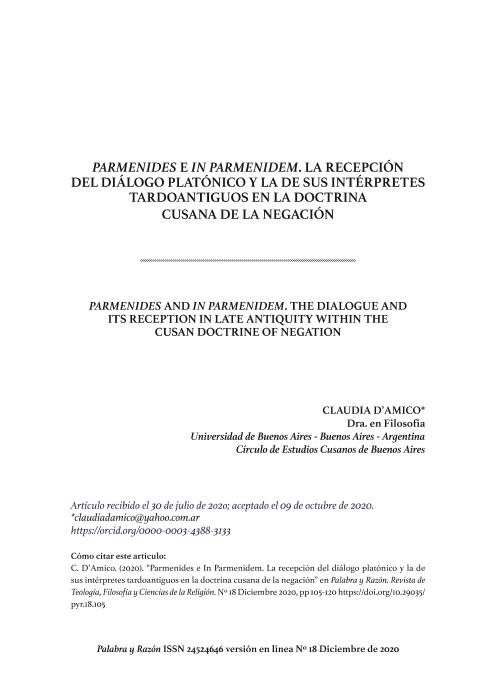Mostrar el registro sencillo del ítem
dc.contributor.author
D'amico, Claudia

dc.date.available
2022-10-13T13:26:06Z
dc.date.issued
2020-12
dc.identifier.citation
D'amico, Claudia; Parmenides e In Parmenidem: la recepción del diálogo platónico y la de sus intérpretes tardoantiguos en la doctrina cusana de la negación; Universidad Católica del Maule; Palabra y Razón; 18; 12-2020; 105-120
dc.identifier.issn
2452-4646
dc.identifier.uri
http://hdl.handle.net/11336/172935
dc.description.abstract
El propósito del artículo es la ubicación de Nicolás de Cusa como parte de la tradición exegética del diálogo Parménides de Platón. Su primer acceso al tema de la negación en el diálogo platónico fue indirecto: a través del corpus areopagiticum y del Comentario de Proclo en la versión de Guillermo de Moerbeke. Luego de la lectura del comentario encarga una versión latina completa del diálogo al célebre aristotélico Jorge Trebisonda. Esa traducción llega a sus manos antes de la redacción del De non aliud y será decisiva para la redacción de esta obra en tanto reformula el vocabulario relativo a la alteridad como modo de la negación. La originalidad de este escrito cusano consiste en la presentación de una fórmula doblemente negativa, inspirada en el Parménides y en sus derivas dionisiana y procleana. Así “non aliud” no es entendido como opuesto a “aliud” sino más bien como la oposición de los opuestos sin oposición.
dc.description.abstract
The purpose of the paper is to locate Nicholas of Cusa as part of the exegetical tradition of Plato’s Parmenides dialogue. His first access to the topic of negation in Platonic dialogue was indirect, through the corpus Areopagiticum and Proclus’ Commentary in the Latin version done by William of Moerbeke. After reading the Commentary, he asked the famous Aristotelian George of Trebisonda to make a Latin version of the whole dialogue. He read this translation before writing De non aliud and it proved decisive for the writing of that work because it reformulates the vocabulary related to otherness as a mode of negation. The originality of this Cusan text consists in the presentation of a double negative formula, inspired by the dialogue Parmenides and its Dionysian and Proclean interpretations. Thus “non aliud” is not understood as opposed to “aliud” but rather as the opposition of the opposites without opposition.
dc.format
application/pdf
dc.language.iso
spa
dc.publisher
Universidad Católica del Maule
dc.rights
info:eu-repo/semantics/openAccess
dc.rights.uri
https://creativecommons.org/licenses/by-nc-sa/2.5/ar/
dc.subject
NICOLÁS DE CUSA
dc.subject
PARMÉNIDES
dc.subject
NEGACIÓN
dc.subject
PROCLO/DIONISIO
dc.subject.classification
Filosofía, Historia y Filosofía de la Ciencia y la Tecnología

dc.subject.classification
Filosofía, Ética y Religión

dc.subject.classification
HUMANIDADES

dc.title
Parmenides e In Parmenidem: la recepción del diálogo platónico y la de sus intérpretes tardoantiguos en la doctrina cusana de la negación
dc.title
Parmenides and In Parmenidem: the dialogue and its reception in late antiquity within the cusan doctrine of negation
dc.type
info:eu-repo/semantics/article
dc.type
info:ar-repo/semantics/artículo
dc.type
info:eu-repo/semantics/publishedVersion
dc.date.updated
2022-10-11T19:33:41Z
dc.journal.number
18
dc.journal.pagination
105-120
dc.journal.pais
Chile

dc.journal.ciudad
Talca
dc.description.fil
Fil: D'amico, Claudia. Consejo Nacional de Investigaciones Científicas y Técnicas; Argentina. Universidad de Buenos Aires. Facultad de Filosofía y Letras. Centro de Estudios de Filosofía Medieval; Argentina
dc.journal.title
Palabra y Razón
dc.relation.alternativeid
info:eu-repo/semantics/altIdentifier/url/https://revistapyr.ucm.cl/article/view/635
dc.relation.alternativeid
info:eu-repo/semantics/altIdentifier/doi/https://doi.org/10.29035/pyr.18.105
Archivos asociados
